Reshuffling the syntax of couple behaviour may be the only way to bring the relationship back from the dead. This is a film of missed appointments and of 'letters' sent, to paraphrase Lacan, that despite all odds, always arrive at their destination.
Mihal Brezis and Oded Binnun’s fearlessly original and smart Dead Language (a highlight in the Viewpoints programme of the 24th edition of the Tribeca Festival), evolving out of their Oscar-nominated short, Aya, begins in the arrival area of an airport, where Aya (Sarah Adler of Samuel Maoz’s Foxtrot, opposite Lior Ashkenazi, and Sofia Coppola’s Marie Antoinette), instead of picking up her husband Aviad (Yehezkel Lazarov, former star of Batsheva Dance Company) pretends to be the driver for the unwitting Mr. Esben (Ulrich Thompsen of Thomas Vinterberg’s Festen), who is in Jerusalem on a business trip as a lighting designer.
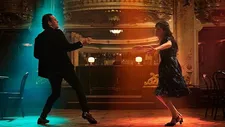 |
| Aviad (Yehezkel Lazarov) dancing to Depeche Mode’s Enjoy the Silence with Aya (Sarah Adler) |
Lars Eidinger, playing a hotel guest with the sang froid of a werewolf, at first not interested in whatever Aya is offering, functions as uncanny catalyst to desires as the plot unfolds in unpredictable ways, better left to enjoy without prior knowledge. Filled with what-if-situations that are played out, Dead Language brings to life possibilities most people might perhaps have thought about, but never dared to experience. Breaking social conventions of interactions is dangerous and in our exceedingly online world, flesh and blood derring-do in approaching strangers is rare.
From Paris, Mihal Brezis and Oded Binnun joined music producer and 99 Records founder Ed Bahlman and me on Zoom for an in-depth conversation on Dead Language.
Anne-Katrin Titze: Hi! Nice to meet you! Where are you?
Mihal Brezis: Hi! Nice to meet you! We are in Paris right now.
AKT: So it's very late for you!
MB: It’s11pm. We just put our 5-year-old to bed. She has so much energy. And so 11pm is when we can schedule Zoom talks.
AKT: Your film has so many surprises, there's so much happening below the surface. You begin at an airport and immediately my thoughts about how the story could be evolving went to all these wonderful classic love stories that begin at places of departure or arrival. Brief Encounter by David Lean, that takes place at a train station, or An Affair To Remember with Cary Grant and Deborah Kerr on the ocean liner. And then something entirely else happens in your film. This kind of meeting place evokes a cinematic language that maybe is a little bit dead. You come in and change it all around. Can you talk a bit about this beginning!
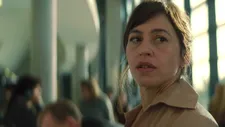 |
| Aya (Sarah Adler) at the airport |
MB: It's interesting, I agree. I think airports have something. It's not like the train stations in the films you mentioned that are more classical, but it has this kind of quality. It's a little bit of a no man's land. It's a place where you don't belong to a certain space. It's like between borders, right? And you have some freedom in this sort of no man's land, and I think this is kind of perhaps what also allows our story to evolve, this place, this atmosphere. I can speak for myself. I remember as a young woman having a special feeling in airports, as a young girl. Maybe it's a sort of a romanticism, but it is this, no man's land. I remember myself waiting for my father at some point and imagining it was sort of a role play in my head. What if I would play that I was the daughter of someone else?
AKT: So was in a way the origin of your film, waiting for your father?
MB: It's not a specific moment in time, but I think it's perhaps more of an openness to curiosity for strangers, for the other. Some things that I can relate to. I actually grew up in a religious environment, a religious family. So it always comes with strict rules and limitations. And I think that sort of drove my curiosity to the other world, to strangers I didn't know, to different worlds. And that's the airport. The airport is where you can meet people that come from anywhere in the world, and each has their stories. And so yes, I think it does come from there.
AKT: The world is opening up in these spaces. There's always a what-if possibility and I think you play beautifully with it, with the help of a great cast. Sarah Adler, I know from Foxtrot with Lior Ashkenazi, where she was great. I talked with Lior and the director, Samuel Maoz, about that. Ulrich Thompsen, of course, from The Celebration [Festen] by Thomas Vinterberg. Both of them were in your short, Aya, as well, and they returned.
 |
| Aya (Sarah Adler) with Mr. Esben (Ulrich Thompsen) |
Oded Binnun: Yeah, both of them are amazing actors to work with. We always refer to them as masters of the nuance. They're like competing with each other. Who's better at nuance and for us, for our way of filmmaking it is exactly what we're looking for, to capture the tiniest nuances. So we had a great collaboration in the short. But then it took ten more years to develop the feature-length movie, because meanwhile, after the nomination for the Oscar of the short, we went to do a big American film with Brian Cox and Rosanna Arquette, and it took us time to return to the original plan of doing this full length feature about this character of Aya.
In the script originally Aya was still 27 years old, like she was in the script of the short. And so we didn't really think about doing it again with Sarah and Ulrich. We actually felt it's important for the story, we thought that it's more believable, or you wouldn't grasp her as crazy if she's in her twenties, you would think it's more of a coming of age story. So all the ideas of her entering hotel rooms and picking up this stranger felt to us that we need to keep it in this kind of age. So we actually had a very long casting process. We looked for every actress possible.
MB: We told Sarah, look, you know, in the script she's younger. She was aware that we're doing this big casting process.
OB: But somehow it didn't work. Nobody came close to what we felt is needed, and in a way nobody could fill Sarah's shoes, and it took us a lot of time to understand it. But when we did understand it, we just decided, okay, let's change the age of the character and see what happens. And actually it's really surprising. What's disturbing in filmmaking is that you always realise that good things half of the time come by luck. So by luck we realised that it works better if the character is older, so also the relationship of the couple is more meaningful. You feel they have something to lose. They fight for something. It's not like a relationship in your twenties, which is just another one, and also everything that happens to the character of Aya is somehow more deep and more meaningful at this age.
 |
| Mr. Jacob (Lars Eidinger) |
AKT: Yes, it adds an extra dimension, also the fact that the actors are returning from the short. There's communication between the two films. And then Lars Eidinger is added to it. He is fantastic, as always, and very mysterious there in his chair. How did Lars Eidinger enter the picture? And in this particular role?
OB: Right! Lars was maybe the biggest surprise of the film for us, because we had this very strange scene which we didn't really know how to approach in terms of casting. It was very hard to picture who would be able to portray this enigmatic person. And somehow Lars was suggested to us by a casting agent from London. We didn't know him beforehand and soon enough when we saw clips of him we understood that we have something extraordinary.
MB: We were just magnetised, you know.
OB: And then, when we met him, he was so generous and kind. He was telling us that he didn't really understand why his agent was sending him a script where he only has one scene to make, and he has to travel a long way to do it just for one shooting day. But he told us that he read the script, which he loved, and it was for him like somebody would tell him, don't do the whole Hamlet, just do the to-be-or-not-to-be part! He was telling us that this one scene for him encapsulates the whole story. And it also was a revelation to us. Him talking about the scene opened for us things that we didn't find in it. The fact that he talked about it like a great love scene.
AKT: He is perfect in its ambivalence. Now we have to also include the fourth great actor, Yehezkel Lazarov, who gets a wonderful dance scene at the end to a Depeche Mode song. Are you aware that Depeche Mode has a documentary in Tribeca?
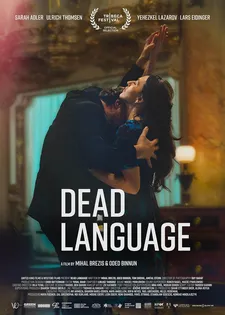 |
| Dead Language poster |
MB: We are aware! They had to agree to let us have the rights of the music in the film, and it took them very long to do so, because they were on tour when we asked for it. So we had to wait for them to do the whole tour, and then we wrote them a letter, and they gave their approval. And now the first thing when we saw that they have a documentary is that again we invited them, hoping they could come. But unfortunately they're not in New York anymore. So we were really hoping to be able to share the film with them, because their music really added so much. We couldn't imagine any other song there.
OB: We actually shot the scene with the actors to that music before we knew it would be possible to get it, because nothing fit better than that music. It was a real honour and real privilege. Usually you use the best music you want in the edit or in the shoot, and you have to exchange it, so the fact that we could keep it in the final film is very exciting.
MB: And just to mention about the fourth actor, Yehezkel Lazarov, he's a multidisciplinary talent because he's a film actor, a theater actor, and he's a dancer. He started off actually with dance in the Batsheva Dance Company.
AKT: I saw that, he was in the Batsheva Dance Company. That's very impressive!
MB: He was one of the stars of Batsheva Dance Company 20 years ago, or something like that.
OB: So he's not just a dancer, he’s like an amazing one. At least he was in the start of his career.
MB: And again, I think here, too, like Oded said, to make films you really need to have luck. Because when we cast him there was a very small part for dancing in the script. It was supposed to be like a kind of a slow dance between them, nothing very exciting and we cast him without even thinking that he's a dancer. We had forgotten that. And it's only when we understood, okay, he's our man, and we understood the capabilities that he brings that we decided to make it what it is. And it became such an essential part of the story. But it's really, I must say, it was luck. It was then the understanding that we have something great here, and that we should use it.
AKT: The finale is fantastic! I have someone here who would quickly like to say hello, who has a connection to Depeche Mode, Ed Bahlman, music producer and founder of 99 Records.
MB: Hello! Nice to meet you!
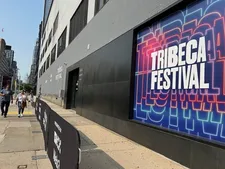 |
| Tribeca Festival at Spring Studios Photo: Anne Katrin Titze |
Ed Bahlman: In the late Seventies and Eighties I had a shop 99, and I only sold imports or independent music from the US. I didn't sell any major American labels and I imported the early Depeche Mode. It was the first place anybody could hear it in the United States.
OB: Wow!
EB: And when I heard those first few notes, I said to Anne- Katrin, that's Depeche Mode. This is crazy. Also the title of the song [Enjoy The Silence] and your film is called Dead Language.
AKT: You have the vow of silence earlier with the Trappist monastery, and then you return to silence. The linguists are there as well. Can you talk about the title a bit?
MB: In terms of the name of our film, Dead Language, it's because her husband is a linguist, and we chose to sort of refer to it through his eyes. And, of course, for us language, dead language, is also a metaphor for a relationship. What is interesting in the world of linguistics is that you have extinct languages, and you have dead languages. Extinct languages are languages that no one talks anymore. They will never [return], no one will ever speak them again, they are a thing of the past.
But dead languages are languages where still there are native speakers, and they can always revive. And the idea here of the metaphor is obviously their relationship is at a sort of dead point. But will they be able to revive it, will they be able to bring it back again? And so that was the name of our film. But I think absolutely when we heard the music and the fact that it is Enjoy The Silence, it meant a lot to us. Because I think language is also the bridge, the connection between people. What Aya tries to do all the time, connect to create that connection. And sometimes you wonder, does the connection happen through words? Or is it actually more without the words that you're able to connect?
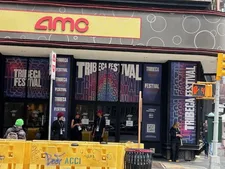 |
| Tribeca Festival at AMC 19th St. East 6 Photo: Anne Katrin Titze |
For Aya herself, her search is to connect on a much more visceral level, to find intimacy, not through the words, not through the head but something much more basic. And so I think this is where also the song and enjoy the silence comes in. And that's actually what we wrote to them. Now I remember, we said this scene when we had to ask them for further approval, we wrote them that it's a scene of enjoy the silence. It's a scene of two people who are enjoying sort of being with one another, not with words, with something greater than words.
EB: Another connection to myself is that a friend of mine from those early days, Anton Corbijn, the photographer and videographer, also did their official video for Enjoy The Silence, similar to the Joy Division Atmosphere one he did earlier. I thought how can there be so many connections? And then the phone answering machine scene, when she doesn't get him, there's the silence at the very end of his recording. It says, the silence.
MB: Oh, yes, silence is golden.
OB: Right! Silence is golden. Yes. Nice.
EB: One of the best dance scenes to a popular song ever.
MB: Thank you so much. Are you going to see their documentary in Tribeca?
EB: We're hoping to get a link. We saw the Culture Club one, which is very intimate, because all four of them talk about their experiences. And it's so personal from them, they're really confessing about disappointments with fame and everything.
MB: If you get to talk to the band, tell them our gratitude!
EB: Well, definitely!
 |
| Tribeca Festival |
AKT: By the way, Ed passed the bag test [which plays a part in Dead Language]!
MB: Are you happy about it or not? That's the question.
AKT: Is it the question? No, I was happy about it.
EB: I was happy about it too!
AKT: Where did the bag test come from?
MB: It's interesting. I still remember we were discussing this restaurant scene and we were just trying to think of what is this? I mean, this whole scene is about him knowing her and him being so sure that he knows her. And her instead of being satisfied with that, actually the contrary, sort of being annoyed or frustrated, that he takes her for granted this way. And then from this basis we made it up, the bag test.
I remember that when we were doing the rehearsals for the scene of the four actors, who are four great actors, and to sort of break the ice, on the first day we brought them in, and we said, now we'll play it. Each one of you brings out something out of your bag. A bit in a different way, but each one brings out something from your bag and says something about it. Immediately it was such an icebreaker. There's something about this intimacy.
AKT: It’s revealing what you have in your bag, and who knows what's in your bag. That's very personal in a language that is different from the spoken language. I also have to ask you about the AI interview, which is very scary. It feels realistic, AI telling humans how to behave properly! And the 80%, 82% sales prediction is a world we're entering. That was not there ten years ago, was it?
OB: Actually, ten years ago, when we started working on it, it was kind of very futuristic and now it’s part of our day-to day.
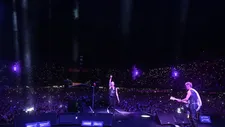 |
| Fernando Frías’s Depeche Mode: M had its world première at the Tribeca Festival |
MB: We were reading Yuval Noah Harari’s Sapiens [: A Brief History Of Humankind] who was as a historian already quite early on starting to talk about it. And it was reading him talking about AI that we started to develop it, and to feel how soon enough AI will be sort of super-humans having emotions like us, and then we wanted to ask the question: Can it really replace us humans? Does it really have this capability? And I think somehow in this scene, maybe you discover that, yes, it can be very, very close to us in knowing everything. But there is this human quality that is maybe more complex. What is it that makes us human, and that AI will never be able to have? This is why, as you say, the AI will see in this a deal potential.
OB: I think the interesting thing is that you can say that AI can do many things, but it cannot live for us, and really being alive is all about the messiness, is all about the complexities of relationships and this is something that we have to experience for our own. Because just that's what life’s about. So it can maybe replace us, and we won't have work. But to be in connection, to be loved, to love and all the complexities of it, that's not for it, that's for us.
AKT: Yes, being human is not all about predictions of sales. At the very end when the credits are rolling, the music has a bit of what Bernard Herrmann did for the shower scene in Psycho. Did I make that up, or did I hear it correctly?
OB: I think you sensed a tension that we tried to infuse in that moment. Because for us this ending is an open ending. You ask yourself, how will it evolve? I mean, will they be able to infuse what would happen when they stop this game? What would happen when they return to their normal life and do they have a chance together? So there's both the romantic side of this kind of ending and there's the thriller kind of emotions.
AKT: Thank you for this film and for speaking to us!
MB&OB: Thank you so much!






















